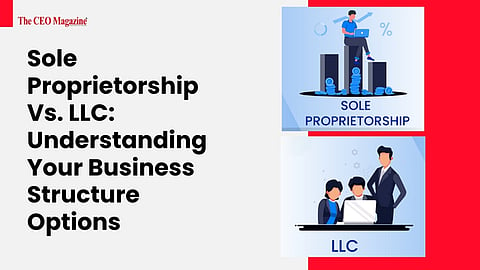
- News
- Women
- Magazine
- IndustryIndustry
- InsightsInsights
- Success Stories
- PublishPublish
- ContactContact
- Media KitMedia Kit

Sole Proprietorship Vs. LLC: Understanding Your Business Structure Options
When starting a business, one of the first and most crucial decisions you’ll make is choosing the right legal structure. Among the most common options are sole proprietorships and Limited Liability Companies (LLCs). Each structure has its unique advantages and disadvantages, which can significantly impact your business operations, taxes, liability, and more. This article delves into the key differences between sole proprietorships and LLCs to help you make an informed decision.
A sole proprietorship is the simplest and most common form of business structure. It is owned and operated by a single individual, who is entitled to all profits and responsible for all debts and obligations. Here are some of the defining characteristics of a sole proprietorship:
Ease of Formation: Setting up a sole proprietorship is straightforward, often requiring minimal paperwork and no formal registration. In many cases, you may only need a business license or permit to operate legally.
Full Control: The owner has complete control over business decisions and operations, allowing for quick decision-making and flexibility.
Pass-Through Taxation: Profits are reported on the owner’s personal income tax return, avoiding double taxation. This can simplify the tax process.
Simplicity: With minimal regulatory requirements and straightforward tax treatment, sole proprietorships are easy to establish and maintain.
Complete Control: As the sole owner, you have the freedom to make all business decisions without needing consensus from partners or shareholders.
Direct Tax Benefits: Income is taxed once, reducing the overall tax burden compared to structures subject to double taxation.
Unlimited Liability: The owner is personally liable for all business debts and legal obligations. This means personal assets could be at risk in the event of a lawsuit or debt.
Difficulty in Raising Capital: Sole proprietorships may struggle to secure financing, as they often rely on personal savings or loans. Investors typically prefer more formal business structures.
Limited Lifespan: The business may dissolve upon the owner's death or decision to cease operations, which can complicate succession planning.
A Limited Liability Company (LLC) is a hybrid business structure that combines the benefits of a corporation and a sole proprietorship or partnership. An LLC protects its owners (known as members) from personal liability for business debts, providing a shield against lawsuits and claims. Here are some characteristics of an LLC:
Limited Liability: Members are generally not personally liable for the debts and liabilities of the LLC, safeguarding personal assets.
Flexible Management: An LLC can be managed by its members or by appointed managers, providing flexibility in operational structure.
Pass-Through Taxation: Like sole proprietorships, LLCs can benefit from pass-through taxation, where profits are reported on the members’ personal tax returns. However, they also have the option to be taxed as a corporation if it is more beneficial.
Limited Liability Protection: The primary advantage of an LLC is the limited liability protection it offers, which is especially important for businesses that face significant risks.
Credibility: Operating as an LLC can enhance your business’s credibility with customers, suppliers, and potential investors.
Flexible Tax Treatment: LLCs can choose how they want to be taxed, whether as a sole proprietorship, partnership, or corporation, offering more tax planning options.
Complexity and Cost: Forming and maintaining an LLC requires more paperwork and can incur higher costs than a sole proprietorship. There may be state-specific requirements and fees.
Regulatory Compliance: LLCs are subject to ongoing compliance obligations, such as annual reports and fees, which can vary by state.
Limited Ownership Transferability: Transferring ownership in an LLC can be more complicated than in a sole proprietorship, often requiring the approval of existing members.
Aspect
Sole Proprietorship
LLC
Formation
Easy to set up with minimal paperwork
Requires registration and compliance with state laws
Liability
Unlimited personal liability
Limited liability protection for members
Taxation
Pass-through taxation
Pass-through or corporate taxation options
Control
Full control by the owner
Flexible management structure
Credibility
May appear less credible to investors
Generally more credible due to formal structure
Choosing between a sole proprietorship and an LLC depends on your business goals, risk tolerance, and preferences. If you seek simplicity and full control, a sole proprietorship may be suitable. However, if you want liability protection and a more formal business structure, an LLC is likely the better choice. Always consider consulting with a legal or financial professional to understand the implications of each structure in relation to your specific circumstances.
Follow us on Google News
